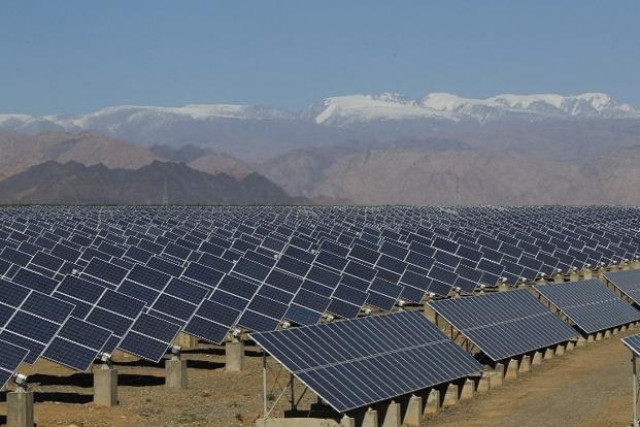Renewables gaining increasing attention
Nuclear, bio-energy, wind and solar sources can tackle dominance of fossil fuels

PHOTO: AFP
It serves as a bridge between the government, industry and academia and is Pakistan’s premier energy think tank to undertake sustainable policy formulation to help Pakistan unleash its enormous potential for economic growth.
There is a need to link policy research and advocacy with policy implementation and practice. USPCAS-E seeks to identify barriers that policy-makers and regulators should remove to improve efficiency and outreach of energy to communities through multi-stakeholder engagement around an achievable, shared vision. The International Renewable Energy Agency (IRENA) identifies the following six energy development goals that, either alone or in combination, commonly shape energy development pathways, namely, energy security, energy access, energy cost, international competitiveness, modernisation and greenhouse gas (GHG) emissions reduction or mitigation of climate change.
Accordingly, a modern energy supply follows the guiding objective of sustainable development. It combines security of supply, ability to compete and environmental compatibility. Renewable energy is particularly suited to fulfil these criteria. The case for renewables is gaining increasing attention in the wake of climate change. A recent study at MIT concludes that even if all nations meet their Paris Agreement commitments, the world will exceed the 2-degree centigrade maximum increase in global temperature targeted for 2100 as early as 2050.
With business as usual, renewables and nuclear energy may grow, but the world energy mix will continue to be dominated by fossil fuels (coal, oil and gas). To avoid this outcome, countries will need to muster innovative R&D to lower technology costs and increase both efficiency and deployment.
Aggressive positive interventions will have to be undertaken to disrupt the fossil fuel domination in the present day energy mix.
Nuclear, bio-energy, wind and solar are the primary contenders for such a disruption. However, each one has its limitations, given the current state of technology.
Nuclear is capital-intensive, but boasts of the highest power factor of all. Bio-energy is carbon neutral, but requires mass-scale cultivation of energy crops together with efficient utilisation of existing feedstock. It can become an important source of primary energy both for generating electricity and as liquid fuel for replacing oil products.
Bio-energy potential is now well documented as a result of biomass resource mapping in Pakistan. In an AEDB-World Bank sponsored study, the energy centre at NUST conducted the field-based survey that culminated in Pakistan’s first Biomass Atlas available at the World Bank website.
Wind and solar currently enjoy the largest deployment of renewables worldwide and have seen substantial increment in Pakistan as well. Projects of 750MW have come up in the wind corridor, while around 500MW of solar power is being added annually in the country.
During her visit to the NUST energy centre, Nobel Laureate Professor Sally Benson of Stanford University concluded in her analysis that both wind and solar are net energy contributors. Given low-cost solar and the progressive wind energy deployment, renewable energy may make up a sizeable portion of all electricity generation, with another chunk coming from bio-electricity.
However, for wind and solar to play a dominant role, the intermittency problem would have to be solved by inexpensive energy storage, or advances in grid operation. Otherwise, the cost of both backup capacity, for example, gas turbines and battery electricity, makes the larger-scale penetration of renewables economically infeasible. USPCAS-E NUST is conducting relevant research in solar and energy storage in conjunction with its collaborating partners, namely the Arizona State University with the aim of increasing battery energy density and cycle life together with establishing facilities to offer third-party accreditation of solar panels to ensure quality deployment.
Researchers at MIT conclude that the transition to a dramatically different global energy mix must be well under way within the next decade to prevent an excessive temperature rise by 2100. It is recognised that such an undertaking will almost certainly require extraordinary political will along with sudden and unforeseen breakthrough in technology.
Substantial R&D investment is needed to develop current technologies, explore new ones and increase the efficiency with which we use energy so less is required in the future.
The writer is the principal and dean of US-Pakistan Centre for Energy, NUST
Published in The Express Tribune, August 14th, 2017.
Like Business on Facebook, follow @TribuneBiz on Twitter to stay informed and join in the conversation.



















COMMENTS
Comments are moderated and generally will be posted if they are on-topic and not abusive.
For more information, please see our Comments FAQ